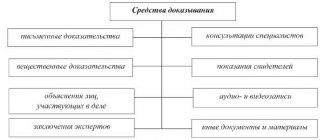ST 303 of the Criminal Code of the Russian Federation.
1. Falsification of evidence in a civil or administrative case by a person participating in the case, or his representative, as well as falsification of evidence in a case of an administrative offense by a participant in the proceedings in a case of an administrative offense or his representative, as well as falsification of evidence by an official authorized to consider cases of administrative offenses, or an official authorized to draw up protocols on administrative offenses -
shall be punishable by a fine in the amount of one hundred thousand to three hundred thousand rubles, or in the amount of the wages or other income of the convicted person for a period of one to two years, or by compulsory labor for a term of up to four hundred eighty hours, or by corrective labor for a term of up to two years, or by arrest. for up to four months.
2. Falsification of evidence in a criminal case by the person conducting the inquiry, investigator, prosecutor or defense attorney -
is punishable by restriction of freedom for a term of up to three years, or forced labor for a term of up to three years with deprivation of the right to hold certain positions or engage in certain activities for a term of up to three years or without it, or imprisonment for a term of up to five years with deprivation of the right to occupy certain positions or engage in certain activities for a period of up to three years.
3. Falsification of evidence in a criminal case of a grave or especially grave crime, as well as falsification of evidence that entailed grave consequences, -
shall be punishable by imprisonment for a term of up to seven years with deprivation of the right to hold certain positions or engage in certain activities for a term of up to three years.
4. Falsification of the results of operational investigative activities by a person authorized to conduct operational investigative activities for the purpose of criminal prosecution of a person who is obviously not involved in the commission of a crime, or for the purpose of causing harm to honor, dignity and business reputation -
shall be punishable by a fine in the amount of up to three hundred thousand rubles, or in the amount of the wages or other income of the convicted person for a period of up to twelve months, or by deprivation of the right to hold certain positions or engage in certain activities for a term of up to five years, or by imprisonment for a term of up to four years.
Commentary to Art. 303 Criminal Code
1. The subject of the crime is evidence in a civil (part 1) or criminal case (parts 2, 3), the results of operational investigative activities (part 4). Art. is devoted to evidence. 71, 73 Code of Civil Procedure of the Russian Federation, Art. 75, 76 Arbitration Procedure Code of the Russian Federation, Art. 74 Code of Criminal Procedure of the Russian Federation. The results of operational investigative activities should include properly obtained and documented results of operational investigative activities (interview, making inquiries, surveillance, wiretapping telephone conversations, etc.), an exhaustive list of which is given in Art. 6 of the Federal Law of August 12, 1995 N 144-FZ “On operational investigative activities.”
2. The objective side is expressed in the form of actions of falsification, consisting of forgery, distortion (including by destruction), substitution of genuine information (its carriers), objects serving as evidence, information (its carriers), false, artificial objects, obtained from an inappropriate source. In this case, it is important to establish the fact of substitution, in which false evidence or results of operational investigative activities are presented as genuine.
3. The crime is considered completed from the moment falsified evidence or falsification of the results of operational-search activities is presented to the court. Part 3 requires the onset of grave consequences. The concept of grave consequences is an evaluative one; they can consist of an unlawful conviction, a serious illness of the victim, loss of his job, etc.
4. The subjective side is characterized by direct intent. According to Part 4, it is necessary to establish the special purpose of criminal prosecution of a person who is obviously not involved in the commission of a crime, or the purpose of causing harm to honor, dignity and business reputation.
5. Special subject: persons participating in a civil case and having the right to present evidence (civil plaintiff, civil defendant, their representatives) (Part 1); the person conducting the inquiry, investigator (head of the investigative body, head of the inquiry body), prosecutor or defense attorney (parts 2, 3); persons authorized to conduct operational-search activities (Part 4).
Falsification of the protocol of a court hearing. Sleight of hand and no fraud.
Dear Valery Mikhailovich, ↓ Read in full ↓ I will honestly answer you: honestly, I don’t know any legal methods other than those indicated in Articles 140, 141, 143, 144, 145 of the Code of Criminal Procedure of the Russian Federation... Appeals to the KKS and VKKS do not give results... I applied in the past 4 years repeatedly... I repeatedly contacted both the Kolpino Prosecutor's Office and the Kolpino Investigative Department of the Main Investigative Directorate of the RF IC for St. Petersburg... and people applied higher up to the RF IC and the General Prosecutor's Office of the Russian Federation, but everything goes down... to the Main Investigative Directorate of the RF IC for St. Petersburg and simply nothing is being done. Unlike the suspect discussed in this thread (according to the resolution) Nikitenko V.N., I am puny in build, family (son, daughter and granddaughter) - therefore, my age and family do not allow me to make a fuss. It would seem that I am acting strictly according to the law - I challenge the judge, call her what she is, that is, a CRIMINAL, and give reasons why I call her that... she committed crimes and not only she, but also her friends, two other judges. It would seem that everything is according to the law and, as a law-abiding citizen, I am waiting for a legal reaction - the drawing up of a Protocol accusing citizen M.M. Akhmetov. of insulting the court and slandering a judge, transmitting a message to the RF Investigative Committee (district). The information must be verified - is it true or not?! If it does not correspond, then Akhmetov M.M. must be convicted of spreading slanderous fabrications against judges and the defendant in the case (Articles 297, 298.1 and 319 of the Criminal Code of the Russian Federation, if I understand the law correctly). If true, then there should be a trial - the judges in a civil trial committed a miscarriage of justice and, in good faith, mistakenly legalized the falsified financial documents presented by the defendant in the form of false financial documents in the amount of more than 1,500,000 rubles (three episodes: the first on 04/02/2013, more than 15,500 rubles from a non-existent IP and 12/12/2013, two episodes of 876,000 rubles or more). If the judge made a mistake and was mistaken in good faith, then the defendant should be held accountable under Art. 303 of the Criminal Code of the Russian Federation in conjunction with the norms of Art. 159, 170.1, 285.3, 325 and 327 of the Criminal Code of the Russian Federation. It seems like I’m presenting everything logically? However, if you listened to my stated challenge to the judge and her reaction to it, it turns out that the criminal judge does not satisfy the challenge and the crime continues and she continues to hide both criminals and her own crime... What should I do? Understanding Nikitenko V.N. perfectly well, I do not want, as a family man, to “make a fuss” and actually commit real administrative offenses or crimes in order to draw attention to this... Family and children, this is still not a lonely person who is more free in your actions. Well, Valery Mikhailovich! What other legal way can you offer to cut the Gordian knot, which has been dragging on since then (08/21/2011) after which I came to the site and asked for advice and help... They even came to the lawyer Elena Vladimirovna Rotkina for an appointment... She told us I wrote two lawyer requests, to which the Kolpinsky PIB GUION put a large one and with a device... I had to stir up the anthill myself and through the District Prosecutor force them to issue documents... Repeatedly in St. Petersburg I applied to the “Legal Centers”, which were furnished cooler than other offices in the Smolny Committees, and when it comes to the debriefing of the flight... the “enthusiasm” immediately disappears somewhere... True, we must give them credit for inviting them from the site and keeping their promises, that is, after an hour or an hour and a half conversations, they let them go home, dejected, and don’t take any money... But that’s the result for me What is needed is the initiation of a criminal case, at least against me, in order to bring to justice the real criminals who committed the crimes. Well, after all, don’t make a fuss, don’t punch judges in the face, don’t call law enforcement, law enforcement and supervisory officials blue or pink... Please, tell me an option! Here is the answer to a citizen who appealed to the General Prosecutor's Office of the Russian Federation and the Investigative Committee of the Russian Federation that I am spreading slander on the QMS Internet and humiliating business reputation and belittling the authority of the judiciary, the prosecutor's office and the investigative authorities... I was never called, but six months later, after the second appeals were written - What is your business madam, Akhmetov M.M. does not in any way affect your rights and your legitimate interests!!! *** Here is a letter so as not to be unfounded and not to look like empty talk...
Second commentary to Art. 303 of the Criminal Code of the Russian Federation
1. Falsification means distortion of factual data that is evidence. It can manifest itself in introducing false information into documents, falsifying them, erasing them, marking them with a different number (material forgery), or expressed in the preparation of written evidence that is false in content (intellectual forgery).
2. The crime is considered completed from the moment the falsified evidence is presented to the court.
3. The subject of the crime is a person participating in the case or his representative. Their concepts are revealed in procedural legislation.
Two categories of persons are directly named in the law as the subject of a crime: officials authorized to consider cases of administrative offenses, and officials authorized to draw up protocols on administrative offenses.
4. Part 2 of the commented article provides for liability for falsification of evidence in a criminal case. In this case, the person conducting the inquiry, the investigator and the prosecutor commit a special type of official forgery, designated by the legislator as an independent crime.
5. The defense attorney in a criminal case may falsify documents and material evidence added to the case at his request.
6. Falsification of evidence by the person conducting the inquiry, the investigator and the prosecutor will be a completed crime from the moment the specified actions are committed; falsification of evidence by a defense attorney - from the moment it is presented to the bodies of inquiry, preliminary investigation or to the court.
7. The subject of a crime under Part 2 of Art. 303 of the Criminal Code are the prosecutor, the investigator, the person conducting the inquiry (the interrogating officer), and the defense attorney.
8. The legislator does not characterize the harm recognized as grave (Part 3), leaving it to the court to do this, taking into account all the circumstances.
9. Operational investigative activities are carried out in accordance with Federal Law dated August 12, 1995 No. 144-FZ “On operational investigative activities” (as amended on July 6, 2016). Falsification of its results is covered by Part 4 of Art. 303 CC.
10. The subject of the crime is special: a person authorized to carry out operational investigative activities.
11. The subjective side of the above crimes is characterized by direct intent. According to Part 4 of the commented article, the purpose of falsification is mandatory; it can be carried out for the purpose, firstly, of criminal prosecution of a person who is obviously not involved in the commission of a crime, and secondly, of causing harm to his honor, dignity and business reputation.
Administrative process
Falsification of evidence in an administrative case entails liability for the following persons:
- Participants in an administrative case considered according to the rules of the CAS of the Russian Federation. These include the parties, the prosecutor, interested parties involved in the process, as well as organizations and individuals who go to court to protect the interests of others.
- Representatives of a participant in an administrative case considered according to the rules of the CAS of the Russian Federation.
- Participants in proceedings in a case of an administrative offense considered according to the rules of the Code of Administrative Offenses of the Russian Federation. The participants include: the person held accountable, the victim and the prosecutor.
- Representatives of a participant in proceedings in a case of an administrative offense, considered according to the rules of the Code of Administrative Offenses of the Russian Federation.
- Persons authorized to consider cases of administrative offenses, that is, to make decisions on bringing to justice.
- Persons authorized to draw up protocols on administrative offenses.
For all of the above persons, liability arises under Part 1 of Art. 303 of the Criminal Code of the Russian Federation. Possible punishment is a fine of 100-300 thousand rubles or in the amount of income for a period of 1-2 years, compulsory work for up to 480 hours, corrective labor for up to 2 years, or arrest for up to 4 months. If serious consequences occur, liability will be under Part 3 of Art. 303 of the Criminal Code of the Russian Federation.
Civil cases
Civil cases are cases considered according to the rules of the Code of Civil Procedure and the Arbitration Procedure Code of the Russian Federation. Falsification of evidence in a civil case entails liability only for the participants in the process and their representatives. The act is qualified under Part 1 of Art. 303 of the Criminal Code of the Russian Federation, and in the event of grave consequences - under Part 3 of Art. 303 of the Criminal Code of the Russian Federation. Severe consequences are an evaluative sign. This could be, for example, provoked bankruptcy, illegal collection, or causing serious damage of another nature, including due to damage to business reputation.
According to the rules of the Code of Civil Procedure of the Russian Federation (Article 186), a participant in the process has the right to declare to the court that the evidence in the case is falsified. In this case, the court may order an examination to verify the stated fact or ask to provide other evidence.
Falsification of evidence in an arbitration case provides for a slightly different procedure:
- A participant in the case has the right to inform the court in writing about the falsification of evidence by another participant in the process.
- The court explains to the parties the consequences of the statement made, including those of a criminal law nature.
- If the party presenting the disputed evidence agrees, this evidence is excluded from the case.
- If the party presenting the disputed evidence objects, the court verifies the validity of the statement made, including ordering an examination.
- The results of consideration of an application for falsification of evidence, regardless of the decision made by the court, are reflected in the minutes of the court session.
Establishing the fact of the commission of a crime in the form of falsification of evidence within the framework of civil and arbitration proceedings is not within the powers of the court considering the case. The maximum that the court can do is to conduct an inspection and, if the fact is confirmed, exclude fraudulent evidence.
The conclusions made by the court may form the basis for the interested party to send a statement of falsification of evidence to the prosecutor's office, the police or the Investigative Committee. At the same time, the crime provided for in Art. 303 of the Criminal Code of the Russian Federation, refers to cases of public prosecution. Such cases can be initiated without a statement from the injured party.
What evidence is considered falsified?
Tampering with evidence, as a crime, is an intentional act. The motives of the perpetrator do not matter. But it is important that the person deliberately falsifies the evidence, distorts its information content in order to pass it off as real, genuine. If the evidence is unreliable due to errors, typos or other unintentional actions, there will be no crime.
Falsified evidence can be:
- evidence;
- protocols;
- documentation;
- video, audio and other materials.
False testimony and expert opinion, despite the fact that they are also evidence, constitute a crime under Art. 303 of the Criminal Code of the Russian Federation are not covered. Moreover, this is criminally punishable (under Article 307 of the Criminal Code of the Russian Federation) only if such testimony or expert opinion appears in a criminal case.
Actions constituting a crime
The crime provided for in Art. 303 of the Criminal Code of the Russian Federation, is committed by a number of actions united by one intent:
- Primary falsification actions may, in particular, consist of the following:
- production of a completely or partially false document, protocol, material;
- introducing false information into a document, protocol, or material or excluding (destructing) truthful information;
- substitution of authentic information and (or) its media with unreliable, artificially created data and (or) media obtained from an unreliable source;
- substitution of things (objects), making changes to them that distort the information value;
- changing the order of things at the scene of a crime (offence) in order to create, instead of the true one, your own, necessary and at the same time false picture of the circumstances of what happened;
- destruction of evidence.
- At the second stage, falsified evidence is passed off as reliable, real. This can be done by presenting evidence to the investigation (inquiry) or to the court. If a crime is committed by a person conducting a criminal investigation or administrative proceedings, the actions, as a rule, consist of adding falsified evidence to the case file.
The consequences of falsifying evidence do not play a special role. They are important only for qualifying the act under Part 3 of Art. 303 of the Criminal Code of the Russian Federation, which provides for grave consequences as a result of such a crime. At the same time, assessing the actions themselves, their consequences, as well as the motives and goals of committing falsification is very important. There are examples in judicial practice when cases under Art. 303 of the Criminal Code of the Russian Federation were terminated due to the insignificance of the crime and the absence of public danger.
If a crime is committed by an official who falsifies official documents, it is official forgery (Article 292 of the Criminal Code of the Russian Federation). However, if we are talking about evidence, then the actions are qualified under Art. 303 of the Criminal Code of the Russian Federation - a special norm in relation to the general art. 292 of the Criminal Code of the Russian Federation.





